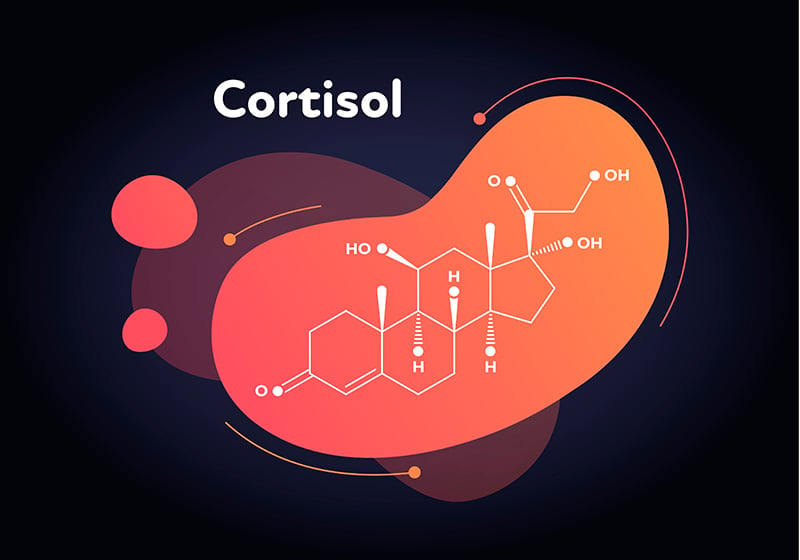
Reviewed and Updated: February 14th, 2024
Stress is an inevitable part of life but it may be causing you much more harm than you have ever realized. Understanding what cortisol is and how it plays a role in our body's stress response system is essential for managing stress effectively and promoting optimal health.
This post explores what cortisol is, factors that increase it and the ways that can be damaging. It will also provide suggestions on lifestyle changes and supplements that can promote lower or optimal cortisol levels for improved health outcomes.
What is Cortisol?

Cortisol is a hormone produced by the adrenal glands, which are located on top of each kidney. Often referred to as the "stress hormone," cortisol plays a vital role in our body's fight-or-flight response. It helps regulate blood sugar levels, metabolism, immune response, and even memory formation. When you are stressed, more cortisol is released into the bloodstream.
What Increases Cortisol?

When stress becomes chronic or overwhelming, cortisol levels can remain consistently high, disrupting the body's balance. Poor sleep habits or inadequate rest can also contribute to elevated cortisol levels, as can an unhealthy diet high in refined sugars, processed foods, alcohol and caffeinated drinks. Lack of physical activity can contribute to elevated cortisol levels but regular exercise helps reduce stress and promote cortisol balance.
Chronic stress can lead to a prolonged elevation of cortisol, which can cause anxiety and depression, high blood pressure, digestive issues, weight gain, and even cognitive decline.
Supplements That May Reduce Cortisol*
Certain supplements have been studied to help lower cortisol levels, but be sure to consult with your healthcare provider before starting supplementation.
Ashwagandha is an adaptogenic herb known for its stress-relieving properties. Its ability to lower cortisol is linked to its modulation of the hypothalamic-pituitary-adrenal (HPA) axis, antioxidant effects, balance of the nervous system, and its calming impact on stress and anxiety. Some research suggests that ashwagandha supplementation may help reduce cortisol levels and alleviate stress symptoms.
Omega-3: Some trials have shown that omega 3 supplementation may potentially reduce cortisol levels by reducing inflammation, regulating the HPA axis, supporting brain function and mood regulation, enhancing serotonin and dopamine signaling, and moderating the sympathetic nervous system. For example in a study of 138 sedentary, overweight participants who received omega-3 supplementation, cortisol and inflammation markers decreased. More robust studies on omega-3 supplementation and cortisol levels are necessary to support these claims.
Probiotics: Gut health plays a crucial role in cortisol regulation. Probiotics contain live microorganisms that help maintain the good bacteria in your gut, which in turn may support cortisol balance. Evidence supports that the gut microbiota influences stress related behaviors and stress itself has a detrimental impact on gut health.
Magnesium: Magnesium is an essential mineral involved in over 300 biochemical reactions in the body and helps control chemical messengers in the brain. Magnesium helps regulate cortisol via the HPA axis, also through its N-methyl-D-aspartate (NMDA) receptor activity, sympathetic nervous system balance, Gamma-Aminobutyric Acid (GABAergic) activity, and stress management. It significantly prevents excessive cortisol production in response to chronic stress and anxiety. Magnesium glycinate and magnesium l-threonate have both been shown to reduce anxiety and stress.
L-Theanine: L-Theanine is an amino acid found in tea leaves known for its calming effects. Research suggests that L-theanine supplementation may help reduce cortisol levels and promote relaxation.
What Foods Can Lower Cortisol?

Incorporating a balanced diet rich in nutrient-dense foods can play a crucial role in supporting cortisol regulation. Fruits and vegetables high in antioxidants, such as berries, oranges, spinach, and kale, help combat oxidative stress and inflammation.
Magnesium rich foods like pumpkin seeds, broccoli, avocados and dark chocolate, may help manage stress and cortisol.
Foods rich in omega-3 fatty acids, such as fatty fish (salmon, mackerel, sardines, herring, and anchovies), have been shown to reduce cortisol levels and combat inflammation in the body.
Lastly, foods that contain pre and probiotics support a healthy gut and can in return support healthy cortisol levels. Some great items that support gut health include yogurt, kimchi, sauerkraut, whole grains, nuts/seeds and legumes.
Lifestyle Changes to Lower Cortisol
Lowering cortisol levels can be achieved through various lifestyle changes that prioritize stress management, quality sleep, regular exercise, and a nutrient-dense diet. Engaging in stress management techniques such as meditation, yoga, listening to music, or connecting with friends can help alleviate stress and reduce cortisol levels.
Prioritizing sleep by maintaining a consistent sleep schedule and aiming for 7-8 hours of sleep each night is essential for cortisol regulation.
Avoiding screen time at least an hour before bed can promote better sleep quality. Including 30 minutes of moderate activity most days of the week with activities like strength training, cycling, swimming, yoga, running, or dancing, can help lower cortisol levels and improve overall well-being.
Lastly, adopting a nutrient-dense diet rich in whole grains, healthy fats, fruits, vegetables, and lean proteins while limiting processed foods can support adrenal health and cortisol balance. By incorporating these lifestyle changes, individuals can effectively manage stress and promote optimal cortisol levels for better health outcomes.
Bottom Line
While cortisol is a natural and necessary hormone, chronic elevation can have detrimental effects on health and well-being. By incorporating stress management techniques, regular exercise, a nutrient dense diet, and supplements, you can support your body's natural cortisol balance and promote overall health. Remember, small changes can make a big difference in managing stress and optimizing your well-being.
*These statements have not been evaluated by the Food and Drug Administration. Products are not intended to diagnose, treat, cure or prevent disease.






Validate your login
Sign In
Create New Account